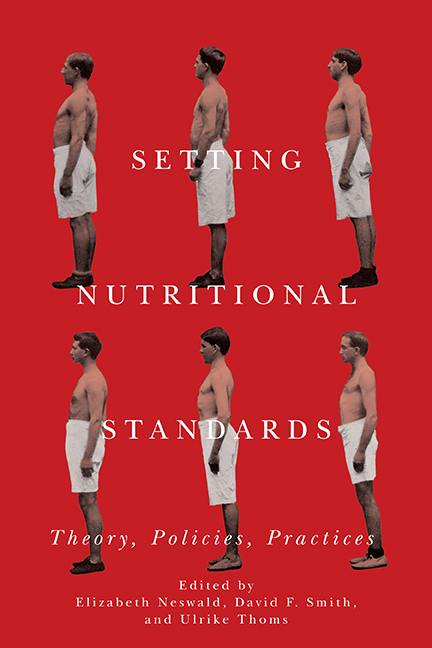Book contents
- Frontmatter
- Contents
- Acknowledgments
- Introduction
- 1 Nutritional Knowledge between the Lab and the Field: The Search for Dietary Norms in the Late Nineteenth and Early Twentieth Centuries
- 2 How Vegetarians, Naturopaths, Scientists, and Physicians Unmade the Protein Standard in Modern Germany
- 3 Of Carnivores and Conquerors: French Nutritional Debates in the Age of Empire, 1890–1914
- 4 Setting Standards: The Soldier's Food in Germany, 1850–1960
- 5 The Quest for a Nutritional El Dorado: Efforts to Demonstrate Dietary Impacts on Resistance to Infectious Disease in the 1920s and 1930s
- 6 “Not a Complete Food for Man”: The Controversy about White versus Wholemeal Bread in Interwar Britain
- 7 “Proscribing Deception”: The Gould Net Weight Amendment and the Origins of Mandatory Nutrition Labeling
- 8 When Is a Famine Not a Famine? Gauging Indian Hunger in Imperial and Cold War Contexts
- Selected Bibliography
- List of Contributors
- Index
5 - The Quest for a Nutritional El Dorado: Efforts to Demonstrate Dietary Impacts on Resistance to Infectious Disease in the 1920s and 1930s
Published online by Cambridge University Press: 18 April 2018
- Frontmatter
- Contents
- Acknowledgments
- Introduction
- 1 Nutritional Knowledge between the Lab and the Field: The Search for Dietary Norms in the Late Nineteenth and Early Twentieth Centuries
- 2 How Vegetarians, Naturopaths, Scientists, and Physicians Unmade the Protein Standard in Modern Germany
- 3 Of Carnivores and Conquerors: French Nutritional Debates in the Age of Empire, 1890–1914
- 4 Setting Standards: The Soldier's Food in Germany, 1850–1960
- 5 The Quest for a Nutritional El Dorado: Efforts to Demonstrate Dietary Impacts on Resistance to Infectious Disease in the 1920s and 1930s
- 6 “Not a Complete Food for Man”: The Controversy about White versus Wholemeal Bread in Interwar Britain
- 7 “Proscribing Deception”: The Gould Net Weight Amendment and the Origins of Mandatory Nutrition Labeling
- 8 When Is a Famine Not a Famine? Gauging Indian Hunger in Imperial and Cold War Contexts
- Selected Bibliography
- List of Contributors
- Index
Summary
Introduction
In a sense, any scientist who embarks on a research program exploring particular connections between diet and health, and who aspires to somehow alter diets in accordance with expected findings, has started a process of setting standards. And, frequently, the links between research and action are by no means simple and linear: research first, followed by policymaking or propaganda. Nutrition scientists are often, for example, publicly enthusiastic about the value of specific nutrients, before beginning new research that they hope will enhance the importance of these nutrients—and themselves. This essay explores an episode in which two groups of nutrition scientists attempted to demonstrate connections between nutrition and health, each focusing on their own favored nutrients. In the concluding section, it will be suggested that this affair illustrates the way in which the priorities of nutrition science are often set. The “activist” dimension of nutrition science, the impulse to set standards, generally means that research priorities reflect the health or social problems that are considered important at the time in wider public, political, medical, and scientific circles.
The context for the story explored in this chapter is Britain during the interwar period. During the First World War, nutrition scientists in Britain had organized and achieved some measure of consensus, largely focused on the need to maintain the efficiency of the military and civilian population via the application of energy and protein standards. Despite resistance from government and civil servants, they had gained a degree of influence on wartime food policy. But soon after peace returned, their hopes to institutionalize a role in policymaking dissipated when the state largely withdrew from the management of food supplies. Researchers who attempted to make their reputations and careers in nutrition science and its applications now lacked the previous benefits of operating in a prolonged national emergency. One way to enhance the profile and power of the field in this situation was to demonstrate that nutrition could address the most significant and intractable problems of the day, such as morbidity and mortality from infections among humans and farm animals.
- Type
- Chapter
- Information
- Setting Nutritional StandardsTheory, Policies, Practices, pp. 119 - 141Publisher: Boydell & BrewerPrint publication year: 2017

